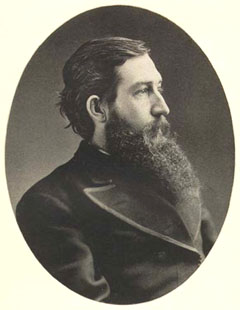| Sidney Lanier  Born: 3-Feb-1842 Born: 3-Feb-1842
Birthplace: Macon, GA
Died: 7-Sep-1881
Location of death: Lynn, NC
Cause of death: unspecified
Remains: Buried, Green Mount Cemetery, Baltimore, MD
Gender: Male
Race or Ethnicity: White
Sexual orientation: Straight
Occupation: Poet Nationality: United States
Executive summary: Important Southern lyrical poet Military service: Confederate Army (1861-) American poet and musician, born at Macon, Georgia, on the 3rd of February 1842. He was of Huguenot descent on his father's side, and of Scottish and Virginian on his mother's. From childhood he was passionately fond of music. His subsequent mastery of the flute helped to support him and greatly increased his reputation. At the age of fourteen he entered Oglethorpe College, where, after graduating with distinction, he held a tutorship. He enlisted in the Confederate Army in April 1861, serving first in Virginia, and finding opportunities to continue his studies. After the Seven Days battles around Richmond, he was transferred to the signal service. About this time the first symptoms of consumption appeared. He subsequently served in a blockade-runner, but his vessel was captured, and he was confined for five months in a Federal prison, his flute proving the best of companions. Exchanged early in 1865, he started home on foot, arriving in a state of exhaustion that led to a severe illness. In 1867 he visited New York in connection with his novel Tiger Lilies -- an immature work, dealing in part with his war experiences. Later in the same year he took charge of a country school in Alabama, and was married to Mary Day of his native town. The next year he returned to Macon in low health, and began to study and practice law with his father. In 1872 he went to Texas for his health, but was forced to return, and he secured an engagement as first flute in the Peabody concerts at Baltimore (December 1873). He wrote a guidebook to Florida (1876), and tales for boys from Froissart, Malory, the Mabinogion and Percy's Reliques (1878-82). He now made congenial friends, such as Bayard Taylor, his reputation gradually increased, and he was enabled to study music and literature, especially Anglo-Saxon poetry. In 1876 he wrote his ambitious cantata for the Centennial Exhibition, and brought his family north. A small volume of verse appeared in the next year. In 1879 he was made lecturer on English literature at Johns Hopkins University. His lectures became the basis of his Science of English Verse (1880) -- his most important prose work, and an admirable discussion of the relations of music and poetry -- and also of his English Novel (New York, 1883), which, devoted largely to George Eliot, is suggestive, but one-sided. Work had to be abandoned on account of growing feebleness, and in the spring of 1881 he was carried to Lynn, North Carolina, to try camp life, and died there on the 7th of September. Since his death his fame has grown steadily and greatly, an enlarged and final edition (1884) of his poems, prepared by his wife, his Letters, 1866-1881 (1899), and several volumes of miscellaneous prose having assisted in keeping his name before the public. A posthumous work on Shakspere and his Forerunners (London, 2 vols., 1902) was edited by H. W. Lanier. Among his more noteworthy poems are "Corn", "The Revenge of Hamish", "Song of the Chattahoochee" and "The Marshes of Glynn." By some his genius is regarded as musical rather than poetic, and his style is considered hectic; by others he is held to be one of the most original and most talented of 19th century American poets, and perhaps the greatest Southern poet to emerge after Edgar Allan Poe.
Wife: Mary Day (m. 1867)
University: Oglethorpe College
Teacher: Lecturer, Johns Hopkins University (1879-)
Risk Factors: Tuberculosis
Author of books:
Tiger Lilies (1867, novel)
The Song of the Chattahoochee (1877, poetry)
Science of English Verse (1880, lectures)
The English Novel (1883, lectures)
Letters of Sidney Lanier 1866-1881 (1889, letters)
Shakspere and his Forerunners (1902, criticism, 2 vols.)
Appears on postage stamps:
USA, Scott #1446 (8 cents, issued 3-Feb-1972)
Do you know something we don't?
Submit a correction or make a comment about this profile
Copyright ©2019 Soylent Communications
|